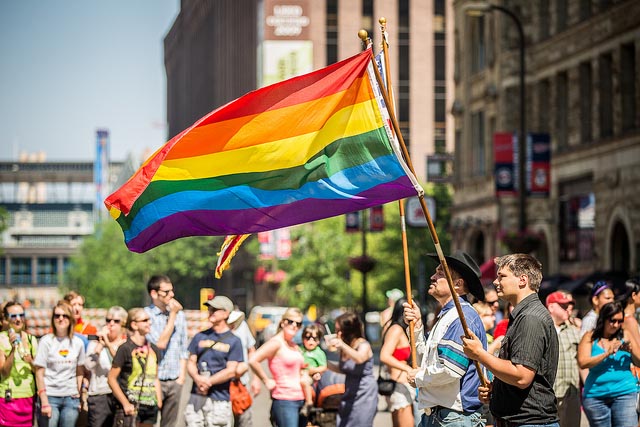The Harsh Truth About Conversion Therapy
With the upcoming inauguration of president-elect Donald Trump and vice president-elect Mike Pence, one of the most controversial issues of America’s new administration is Pence’s history of opposition to LGBTQ+ rights, especially his possible support of conversion therapy. Conversion therapy, or reparative therapy, is a psychological treatment designed to change a person’s sexual orientation to heterosexual, or straight, or gender identity to cisgender, identifying as the gender one was assigned at birth. Conversion therapy often utilizes treatments such as conventional talk therapy, prayer, re-education, hypnosis, or aversion therapy. Aversion therapy is the most controversial form, as it includes electroshock therapy and uses vomit-inducing chemical compounds. This form of “treatment” is sickening and immoral, and it horrifies me to imagine that our future vice president may support the funding of this torturous practice.
“Given that this is a core issue for our vice president-elect, I think naturally this is going to come into the spotlight more,” English teacher and GSA co-adviser Mrs. Lauren Tocci said. “For some of the population, it’s one of the sharpest disagreements they have with him. For others, it can be something they’re happy he supports. We need to look to our media and our government for unbiased representations of what conversion therapy is.”
According to goodtherapy.org, oftentimes the people issuing conversion therapy are not licensed medical or mental health professionals. They may be religious officials, self-taught advocates, or people who claim to have had their sexual orientation or gender identity changed by conversion therapy. Conversion therapy has been disavowed by numerous organizations, such as the American Academy of Child and Adolescent Psychiatry, the American Academy of Pediatrics, the American Counseling Association, the American Medical Association, and the American Psychological Association. However, in other cases conversion therapists may be trained in in psychology or mental health, providing conversion therapy alongside other psychological challenges, such as depression or anxiety.
“Counseling may be helpful for young people who are uncertain about their sexual orientation or for those who are uncertain about how to express their sexuality and might profit from an attempt at clarification through a counseling or psychotherapeutic initiative,” the American Academy of Pediatrics said in a public statement. “Therapy directed at specifically changing sexual orientation is contraindicated, since it can provoke guilt and anxiety while having little or no potential for achieving changes in orientation.”
Conversion therapy can be dangerous, and in some cases, even fatal. According to the American Psychological Association (APA), risks of the practice of conversion therapy include depression, guilt, suicidal thoughts, self-hatred, loss of relationships, problems with sexual and emotional intimacy, and a feeling of being dehumanized. Minors are especially vulnerable, and the risks are even greater. Studies show minors who face rejection due to their sexual orientation or gender identity during adolescence are more than eight times likely to attempt suicide, more than five times likely to have levels of depression, and more than three times likely to engage in unprotected sexual intercourse when compared to adolescents who reported little to no level of familial rejection.
“In truth, [conversion therapy accomplishes] not much of anything,” Mrs. Tocci said. “Its existence only seems to strike fear and to support the notion that orientation is a choice that can be changed.”
In 2007, the APA did a thorough review of the then existing research on the efficacy of conversion therapy. Their report concluded that there was minimal methodologically sound research on sexual orientation change efforts (SOCEs) and that the “results of scientifically valid research indicate that it is unlikely that individuals will be able to reduce same-sex attractions or increase other-sex sexual attractions through SOCE.” If this study disproving the efficacy of conversion therapy took place in 2007, why, in 2016, are many people still considering it as an effective method to “change” someone’s identity? There is clear evidence that conversion therapy does not work, and a significant, overwhelming amount of evidence that it is harmful and damaging to the people undergoing it.
“A lot of intolerance [with the LGBTQ community] is based off misconceptions or stereotypes,” Gay Straight Alliance (GSA) secretary Ben Boyer said. “A lot of younger people who are seen as intolerant might hear things from older generations. They might not try to learn about it themselves, but [instead] listen to the opinions of other people.”
Currently, laws have been passed in California, Washington D.C., Oregon, Illinois, and Vermont, as bills have been introduced in many other states, to prohibit state-licensed mental health professionals from engaging in efforts to change a minor’s sexual orientation or gender identity. These laws include efforts to change gender expressions or behaviors, or to eliminate or reduce sexual or romantic attraction towards individuals of the same gender. These laws also state that the regulated practices do not include therapies that offer acceptance and support, or assist patients’ coping, social support, and identity exploration and development. These laws are especially necessary for the safety of minors, who can be forced to undergo this therapy by a parent or guardian who is disapproving of their sexual orientation and/or identity. These laws are crucial to advocating the protection of members of the LGBTQ community, and ensuring that if they do desire treatment, they are receiving safe, competent care that is not harmful or putting them at risk for life-long mental damage.
“We just need to show [society] the sad truth of [conversion therapy],” freshman Nicole Karol said. “The bottom line is that people are getting hurt. Being a part of the community is not necessarily a choice, [it’s] just how you feel. You can’t change how you feel by shock therapy or being forced into thinking [a certain way].”
In 2015, the Obama administration even declared its support of a ban on minors receiving conversion therapy against their personal consent. This proposed national ban, known as Leelah’s Law, was named after a transgender teen who committed suicide in December of 2014 after stating she was receiving treatment from therapists who were hostile towards her identity. Vice President-elect Pence believes that Congress should oppose any efforts to put homosexual relationships on equal legal status with heterosexual marriage. Our nation went from a progressive country regarding LGBTQ+ rights to electing someone who wants to undo all of our progress. Many of President Obama’s proposals for LGBTQ+ rights were one big step forward for America, and now the inauguration of our homophobic vice president-elect is one gigantic step backwards.

Senior Izza Choudhry is a four-year staff reporter and former one-year copy editor and one-year news editor, now serving as opinion editor for the Spotlight....


